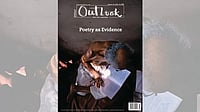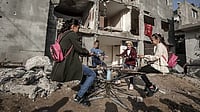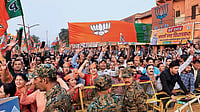As events unfolded, some literally earthshaking, we rushed to ground zero along with the media pack, and strived, like everyone else, for good reportage—but shot through with a capacity for endless irreverence. Here are 15 landmark events, seen through Outlook’s eyes.

Vajpayee, George Fernandes, Kalam at the blast site, ’98
Pokhran N-Test
How A ‘Tired’ PM Became A ‘Bold’ PM
The prime minister states, as he did in his letter to President Clinton, that he is “deeply concerned at the deteriorating security environment, especially the nuclear environment”. If that statement is even 50 per cent correct, all questions must cease immediately; the debate must end. Alas, on the evidence submitted—and there has been precious little—by the government, a completely different conclusion appears unavoidable: India’s security environment in the last few years has not deteriorated, in fact it has improved marginally; there are no new threats to India’s security from any country. There are, however, plenty of threats to the security of Mr Vajpayee’s prime ministership.
India was already a great nation before May 11. It would become an even greater nation if 44 per cent of its population did not live in absolute poverty.
—Vinod Mehta | May 25, 1998
The Road Not Taken
A high-powered US delegation of nuclear experts, defence personnel and state department officials arrived in Pakistan on Friday. It is carrying a big stick and some carrots. An anguished Pakistani PM is in session with his cabinet colleagues. Though scientists say they are ready to press the trigger, and Benazir Bhutto has banded with fundamentalists to demand a test, the Pakistani press is, by and large, against any “knee-jerk” reactions. There are two roads which can be taken. The road not taken could make all the difference.
—Najam Sethi in Lahore | May 25, 1998

The much-maligned Bofors guns in action in Kargil, ’99. (Photograph by Jitender Gupta)
Kargil War
‘If This Is Not War, What Is?’
An undeclared war between India and Pakistan is being waged in the upper reaches of the Kargil-Dras sector of Jammu and Kashmir. This is no David-versus-Goliath battle which Pakistan would have the world believe is being fought by a 600-strong militant force holding out against the might of the world’s fourth-largest army. Make no mistake about it: both in scale and intensity, this is the most prolonged action along the border since the ’71 Bangladesh War.
—Ajith Pillai and Zafar Meraj | June 7, 1999
Command Failure
Investigations carried out by Outlook in Srinagar, Kargil and Delhi reveal that actual warnings and not mere intelligence inputs were made available to the army top brass. And these were sent from Kargil by none other than Brig Singh. While the army has denied that it received any intimation, according to unimpeachable sources, Singh wrote at least six letters to his immediate superiors, the army chief and the defence ministry between August ’98 and March this year, informing them of the “increased threat perceptions and possibility of incursions” by Pakistan-backed infiltrators across the LoC in Kargil. Unfortunately, the information was not taken cognisance of and no action was taken on his warnings.
—Nitin A. Gokhale | August 2, 1999

Clinton gets a grand welcome from the women in Nyala village, Rajasthan
Bill Clinton’s Visit
Bill, Buntings, Beginnings
President William Jefferson Clinton stooped to conquer. With unsuspected sensitivity, tact and charm, he cajoled, persuaded and seduced a diffident India. He chafed against the limitations posed on him not only by a tight schedule but also the tight security around him. The Secret Service were often sweating in the sun because he would give himself to the crowd beyond its endurance. He revelled in the enthusiasm with which Indian parliamentarians scrabbled to shake his hand, almost rushing him off his feet. And he wore the angavastram thrown around his shoulders with pride.
—Janaki Bahadur Kremmer| April 3, 2000
How The East Was Fun
William, a driver from the US embassy, was hanging around the hotel lobby when he saw Clinton come out of the lift. “Mr President, Sir,” he called out. Clinton turned around, and William quickly asked him if he could take his photograph. The security men intervened and tried to push William away. But Clinton stopped them and taking the camera from the driver’s hands, gave it to the security officer. “You take the picture,” he said and posed alongside the driver.
—Priya Sahgal | April 3, 2000

An injured girl surveys the remains of her home in quake-ravaged Bhuj. (Photograph by Prashant Panjiar)
Gujarat Quake
The Angry Earth
It was as if 425 atom bombs had exploded in the earth’s bowels—each equal in power to the ‘Little Boy’, dropped on Hiroshima in 1945. Rumbling a fearsome 8 on the Richter, within seconds it unleashed waves of destruction and mayhem that rippled through the earth from Bhuj—reaching all parts of the subcontinent and even China.
—Rakesh Kalshian | February 5, 2001
HQ, Hell
But in Bhuj that morning, there is silence. It has been 20 hours since the quake struck. And just when it was getting difficult to make sense of it all, the bend on the deserted road suddenly opens out to a huge clearing...hushed voices emanate. And silhouettes of people, mostly lying down. Some are too still. Some are moving. Some occasionally cross over the thin line.
—Manu Joseph | February 12, 2001
Builders And Friends
In the first week after the quake, just as Ahmedabad municipal workers were about to blow up a high-rise considered unsafe in the satellite area of the city, Gujarat’s powerful finance minister Vajubhai Wala ordered the officials to stop the demolition.... Wala also happens to be the biggest property developer and real estate promoter in Gujarat.
—Ranjit Bhushan | February 19, 2001

Even as the first tower burns, a horrified world watches live the second jet zeroing in
9/11
Jehad: On My Behalf
Already, I am inundated with scores of requests to speak and write on Islam and fundamentalism. Is it because the views of a professional historian will enhance the quality of debate? Or, is it simply because I bear a Muslim name and, therefore, am accountable for the conduct of my co-religionists from Morocco to Malaysia?
—Mushirul Hasan | September 24, 2001
Don’t Forget What We Did
The terrorist attacks were major atrocities. But in scale they may not reach the level of many others, for example, Clinton’s bombing of Sudan with no credible pretext, destroying half its pharmaceutical supplies and killing unknown numbers of people (no one knows, because the US blocked an inquiry at the United Nations and no one cares to pursue it). Not to speak of much worse cases, which easily come to mind.
—Noam Chomsky | September 24, 2001

Security personnel take positions during the Parliament attack. (Photograph by T. Narayan)
Attack On Parliament
Shock Therapy
It may not have been quite on the scale of 9/11, but the family resemblance was there for all to see. The targeting of a central symbol of a nation, the willingness on the part of the assailants to sacrifice their lives to attain their objectives, the careful planning that must have preceded the event, the political climate that makes possible such extreme acts—the analogies to the attack on WTC and Pentagon in December 13’s assault on Parliament are plenty.
—Ranjit Bhushan | December 24, 2001
P. Chidambaram, Tamil Maanila Congress (Democratic)
“This is not the time to say that we should take a hard or soft line. It’s clearly time for hard intellect. The fact is that the government has lost complete control of its own intelligence apparatus. For almost one month now, the government itself has been saying that it anticipates an attack on Parliament. Even the prime minister goes to Mumbai and says that Parliament is a likely target—and within 16 hours it is actually attacked.”
—December 24, 2001

Bajrang Dal activist
Gujarat Riots
Is India Rwanda?
The people who perpetrated the Gujarat violence (including the Godhra torching) have not merely further poisoned Hindu-Muslim relations. They have wounded the country in its own eyes and those of the civilised world. Is India a confident, mature, increasingly prosperous world superpower? Or is it a barbaric, tribal, banana republic akin to Rwanda? Can ‘revenge’ become an instrument of state policy?
—Vinod Mehta | March 18, 2002

Riot victim Qutubuddin Ansari pleads to the mob for mercy. (Photograph by Reuters, From Outlook, November 01, 2010)
‘Where Was The Delay?’
Were you playing the fiddle while Gujarat burned?
No. Contrary to what is now being projected, I brought sanity within 72 hours of the violent outbreak. It would take months before communal rioting during the previous Congress
governments could be brought under control and a semblance of normalcy could be restored. This is for the first time that a communal riot has been controlled in record time.
—Outlook interviews Narendra Modi | March 18, 2002

Sonia Gandhi announcing that she would not take on the PM’s job at the CLP meeting, May 18, ’04. (Photograph by T. Narayan)
Sonia’s Refusal To Become PM
The inner voice of Sonia
Sitting through an incredible show of fawning and flattery in the Central Hall of Parliament on the evening of May 18, Sonia must have seen the portraits of national leaders hanging on the panelled walls. Did their eyes stare down at her? Did she see them recoil in horror at the inability of the Indian National Congress—an organisation they too had nurtured—to find one Indian worthy of being prime minister? Did they arouse her inner voice?
—Swapan Dasgupta | May 31, 2004
It Was A Masterstroke
There were others who were equally moved by The Moment. Says playwright Girish Karnad: “This luminous gesture of her self-sacrifice will stand out—she is the Great Mata now. And the dignity with which she did it cleared any doubts I had about her abilities. It was a masterstroke. I couldn’t have scripted it better.”
—Sheela Reddy | May 31, 2004

Anil and Mukesh Ambani at a Reliance AGM prior to the split. (Photograph by AFP, From Outlook, November 01, 2010)
The Ambani Split
The Really Fine Print
Of course, the biggest and the most complex issue seething at the core of the feud is the holding pattern of the Reliance group companies—the way in which hundreds of investment firms in Mumbai and Ahmedabad hold the bulk of the family stake in RIL which, in turn, holds majority or substantial stakes in publicly known firms like Reliance Infocomm, Reliance Energy, IPCL and Reliance Capital.
So what do the hapless advisors on both sides do? Indulge in some black humour even as they try to give that spin to all the news. “Dhirubhai didn’t want Anil to run—run marathons, run away from the group’s flagship RIL, and keep running for life,” quips one. Ambani jokes are the flavour of the cocktail circuit. Try this tired take-off on classic Hindi film Deewar: Anil to Mukesh: “Mere paas maa hai (I’ve mother with me).” Mukesh: “Mere paas maal hai (I’ve got the moolah).”
—Alam Srinivas and Saumya Roy | December 20, 2004

A tsunami survivor being carried away to hospital in Nagapattinam district, Tamil Nadu. (Photograph by Atul Loke)
The Tsunami
Killer Tsunami
Dropping an issue at the end of the year, with the whole office going on a week-long holiday, has been a long and happy Outlook tradition. But there is no point to having traditions unless they are broken sometimes. When the tsunami tore through southern Asia, our Editor was in Egypt, Publisher in Malaysia, Managing Editor somewhere in the mountains of Goa, Deputy Editor in Rajasthan. But the spirit of journalism and global cellphone networks prevailed.... It had to be done, and it has been. But I am sure you, our readers, will join us in our prayer that we never have to do this again—see, record and report human tragedies on such a scale.
—Sandipan Deb | December 30, 2004
Bay Of Blight
Five days after Black Sunday, when the killer tsunami came and ravaged the Nicobar group of islands, the coastline has changed. There is a pall of gloom and the smell of death on the once-pristine stretches of sand.... As the IL-76 circles over the island and comes in to land, one can’t help notice the cracks that have appeared, an indication of the massive destruction that has occurred. Almost as if a giant hand had flattened the landscape in one killing blow.
—Saikat Datta | December 30, 2004

A PPP supporter wails even as others go on the rampage after Benazir’s assassination. (Photograph by AP)
Benazir Assassination
Mohtarma: A critique
There is still a glimmer of hope that Benazir's death might yet strengthen democracy in Pakistan, and end the long and disastrous period of power-sharing between the country's landowners and their military cousins. But sadness at the demise of this courageous woman should not mask the fact that she was as much part of Pakistan's problems as its solution.
—William Dalrymple | January 14, 2008
‘You Can Name Musharraf As My Assassin If I Am Killed’
She said she subsequently wrote a letter naming her would-be assassins. When I asked her who the recipient of the letter was and whether she had named Pakistan President Pervez Musharraf as well, she had smiled and said, “Mind one thing, all those in the establishment who stand to lose power and influence in the post-election set-up are after me, including the General. I can’t give you further details at this stage. However, you can name Musharraf as my assassin if I am killed.”
—Amir Mir | January 14, 2008

Sacked Jet Airways staff protest outside the Jet corporate office in Mumbai. (Photograph by Dinesh Parab)
Global Financial Crisis
Did The Left Save India?
After years of being pilloried in drawing rooms and boardrooms, it’s a rare and delicious I-told-you-so moment for the Left. While the UPA government is revising GDP growth targets downwards to a more modest 7.8 per cent, its erstwhile allies are basking in a moment of glory. As the world economy tailspins, the CPI, CPI(M) and friends are celebrating their tough anti-globalisation stand, saying it was they who saved India by the skin of its teeth from absolute financial ruin. Or so it seems. The question is: by not allowing pension funds to park monies in the stockmarkets, or by blocking further liberalisation in banking and insurance, did the Left really save India? This is not just about adding up debating points: the crisis is very real and the future of economic reforms is uncertain. Governments the world over are rushing in to bail out frozen economies, former US Fed chairman Alan Greenspan has conceded error, and everyone and their mother has a take on the “crisis of capitalism” and the end of free markets.
—Pragya Singh, Lola Nayar and Arti Sharma | November 10, 2008

The Hotel Taj Mumbai during the terrorist siege. (Photograph by Apoorva Salkade)
26/11
Frogmen At The Gate
Of course, Mumbaikars will resume their routine and the city will return to its rhythm in a few days. The indefatigable ‘Mumbai spirit’ would have won one more round of applause. Many, however, say it is this very spirit that enables state and central authorities to mumble inanities after an attack and return to their stupor thereafter. Points out Julio Ribeiro, former police commissioner and Punjab dgp: “We thought the ’93 blasts were the worst, then we thought the 2002-03 series (of blasts) were really bad, then we thought the July train blasts were the worst, now we think the November 2008 attack is the worst. We lull ourselves into a false assurance. We pretend another attack will not happen. We demand nothing concrete from our authorities.”
As Thursday evening wore on, frantic smses passed around asking people to light a candle outside their window at 9 pm, as a subliminal message to the terrorists that Mumbai hadn’t accepted defeat. Some did, many didn’t. Candles make an important statement, but they don’t
prevent terror attacks.
—Smruti Koppikar | December 8, 2008
The Band Stopped Playing
Appalled, we learned it was not just a shootout at Leopold, there had been an attack on the Oberoi and the Taj too. Then we heard more, that hapless people at VT railway station had been fired on, that there was blood all over the floor, and bodies.... That ‘they’ were brazenly roaming the streets, from VT to Cama Hospital to Metro, automatic weapons in hand, rucksacks on their backs. Gloom set in, the fairy lights in the trees seemed to dim, laughter died down completely. People, huddled in groups, left their dinner and spoke in hushed tones. It was clear a huge terrorist plan was unfolding.
—Farzana Contractor | December 8, 2008

Barack Obama takes oath of office as 44th President of USA, January 20, 2009
Obama’s Election
The Devil Departs
Happily, we have the best of results. Obama is good for India, good for the international community, good for America, good for democracy. I do not wish to demonise Bush, but the sort of damage he has inflicted on his country and its cherished values is incalculable. To describe him as a “bungling moron” is far too charitable. It is necessary, therefore, to stop harping on the who-is-good-for-India theme. After all, George Bush was good for India. But look at what he did to the world!
In the past eight Bush years, America has become probably the most hated nation in the world. This incredible victory holds the promise of restoring the moral authority of American democracy and leadership. Could the “miracle” only happen in America? Perhaps, this is the apt time to ask: “When will India get a Muslim prime minister?”
—Vinod Mehta | November 17, 2008
In July 2008, Outlook’s Washington correspondent Ashish Kumar Sen landed a prized exclusive interview with Obama

The young stars of Slumdog Millionaire pose at the Academy Awards, February 22, 2009. (Photograph by AP)
Success Of Slumdog Millionaire
All It Boyles Down To
Danny Boyle has taken the Bollywood form—its melodrama, lack of logic, predictability, stereotypes, cliches and song-'n-dance—and served it to the West with dollops of 'realism'.… The trend du jour is India's underbelly, the India not quite shining. Which is fair enough, you certainly can't wash the overwhelming poverty out of the Indian landscape. Except: Boyle's realism just skims the surface; issues of poverty, child exploitation, images of brutality and violence are forgotten as quickly as they play out on the screen. The only question that remains is: will the boy get the girl, and how?
—Namrata Joshi | January 26, 2009


























